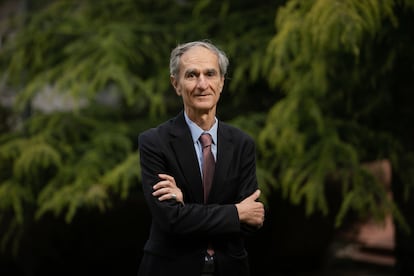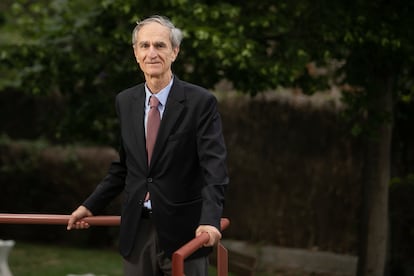Eduardo Bruera, palliative care expert: ‘Suffering can always be relieved, but not eliminated’
The Argentine oncologist, head of the Department of Palliative, Rehabilitation and Integrative Medicine at the MD Anderson Cancer Center in Houston, denounces the lack of investment in end-of-life care and the overtreatment of some terminal patients

When you’re on your deathbed, you just want to be with your family and not suffer. Not much more than that, reflects oncologist and expert in palliative care Eduardo Bruera. He knows what he is talking about: in 1999, this Argentinean doctor launched the Department of Palliative, Rehabilitation and Integrative Medicine of the MD Anderson Cancer Center in Houston, the largest in the United States, and has been there, at countless bedsides, witnessing too many ends. “What I see is what is important to them. And they say that it is being close to their loved ones, not being a burden to them, being free from suffering and also, in most cases, rekindling their spiritual relationship,” explains the oncologist, who was recently in Barcelona to be awarded an honorary doctorate from the International University of Catalonia.
Bruera speaks out against the lack of investment in palliative care and the weight of the taboo that still surrounds death. “Death will come to all of us,” emphasizes the specialist, who urges people to stop looking the other way and improve the end-of-life care.
Question. Is not enough attention paid to palliative care?
Answer. Unfortunately, too little attention is paid to what needs it the most. And that’s in the big hospitals, the medical schools, the places where they make decisions that will have long-term effects on how patients are treated. The existing paradigm right now is based on the diseases, not the patients, and money goes to that. All hospitals have an intensive care unit and very few have a palliative care unit, which doesn’t make much sense because people die in all those hospitals.
Q. Universities teach how to cure patients. If the patient dies, is it taken as a failure, therefore turning the matter into a taboo?
A. I totally agree. If I focus on the fact that my success is linked to curing the sick, I take the fact that they are not cured as a personal and professional failure, I turn away from that battle – because I lost it – and I run out looking for a new one. It’s ironic because every one of us is going to die and it doesn’t make sense to look for a cure for something and forget that the cured person is also going to die. Death will come to all of us.
Q. But nobody wants to talk about death.
A. They don’t, and medicine doesn’t want to invest in making that end of life less painful, either. Undoubtedly, when we reach the end of our lives it will be a very difficult time, but it doesn’t have to be. It’s more difficult because we don’t have the structures and processes to ease that unnecessary suffering.
Q. Why doesn’t medicine want to invest in that?
A. I think it’s a cultural matter. Since the development of antibiotic therapy, medicine became a little more ambitious in changing the natural history of diseases, and it set its sights on that: healing, extending life. And we kind of forget that, in the end, we are all going to die. This cultural change brought about by vaccines and antibiotics made us abandon something that used to make us credible, which was human treatment, the relationship we establish with the patient and the family, the way in which we were able to soothe and comfort when we had fewer means of treatment. What we try to do in palliative care is reintroduce that; not replace the curative intent.
Q. If there is such a rejection and denial of death in society, how is it possible to make a change in the medical field?
A. Changes must be made by accepting, acknowledging and integrating palliative care units, where people who are suffering a lot are relieved of their physical, personal, spiritual and familial suffering, and then die. There is a lot that can be done to reduce suffering, but if we don’t have a clinical model, if there is nothing to show, the taboo will persist and we will continue to turn our backs on death.
Q. What can be done at this stage of life?
A. When I recognize that I have a disease that is not curable, without exception I will experience moral suffering, anxiety, uncertainty, sadness, sometimes anger, other times denial. And that’s part of being alive. We cannot be alive and not suffer. It makes no sense to think that one can avoid that, but if my hospital, my doctor, turn their back on me, I am excessively sad and defeated, there is no help for me, that suffering is aggravated. It makes no sense to think that this stage of my life will be free of suffering, but it does make sense to think that a lot of that suffering can be relieved for me and my loved ones.
Q. How?
A. With structures and processes. I would like to tell a politician that they do not have to invest or create new jobs, but I would also like to tell them that it is an extraordinary investment, and here’s why: at that moment, when a patient with cancer or heart failure goes to see their doctor, they will be told: “Well, you are not responding well to the treatment, let’s give it another month.” And that other month of immunotherapy is tremendously expensive. Laboratory studies and radiology are very expensive and, in general, they are not very useful, but that is the resource that this doctor has to give them hope – and it only takes 10 minutes of their time. A discussion about the disease not responding well could take an hour and a half and put the patient in a situation that the doctor can’t handle, because they are not trained for that, and then what happens? That a huge amount of money is spent, and it is not very useful. Imagine a situation in which the oncologist tells the patient: “Look, I don’t know if there is a treatment, but there is Dr Bruera, who is here with me and who will be a big help.” I see that patient, I spend time with them and they don’t get an expensive treatment; they get me. There is a human hope, because the suffering of the patient and the family is relieved, but there is also an economic hope.
Q. Are there too many useless therapies being given at the end?
A. Yes. And they are given with good intentions, because it is what the doctor can do. But they don’t help much. And they cost a lot and can be toxic. But it is what they can offer.
Q. Is the machine pushed as far as possible to avoid accepting that no more can be done?
A. Because I don’t know what to do, I don’t know how to say it or how to handle it and I don’t have anyone, I don’t have a palliative structure by my side to help me. I am alone, as an oncologist, as a cardiologist, as an internist. I am alone in front of the patient with the knowledge that I have. And I do the best I can do. There are no good and bad guys in this movie. The problem is the movie itself.

Q. What is the current state of palliative care?
A. We know we can do more. We know much more, but we don’t reach patients as we should because we lack the structure. We have incontrovertible evidence that palliative care vastly improves quality of life compared to conventional treatment, but we haven’t gotten the investments that can make it reach the patients. I feel very optimistic that we are evolving, but it saddens me that so many patients who are going to die this year will not have access to it because we still don’t have the intention to establish the structures.
Q. You said a lot has been learned; what else is there to know?
A. What you and I fear the most when we are diagnosed with cancer is pain. Pain is a threat that may be worse than death. If you come with cancer today, I can give you a treatment that is probably no more than two or three years old, because there is a development, an investment, and there are many treatments. If what you have is pain, I will give you a treatment that is 230 years old, which is morphine, which is still the number one treatment. How can it be that the same person to whom one gives a new treatment for a tumor, when they are suffering from pain they get a treatment that is 230 years old, that is not safe, that can cause addiction, that has side effects? We need to do more research on how to treat pain with more modern and evolved methods. There are also not proper studies on how to talk to patients. There are many holes in our knowledge of suffering.
Q. Can suffering always be relieved?
A. Suffering can always be relieved. But, can suffering be eliminated? I would say unfortunately no. But I can comfort the patient, the family, stay by their side and be with them. That has a great relieving effect. Transforming it into something that can be completely eliminated, I think it would not be humanly possible, but it can be greatly relieved.
Q. Can euthanasia coexist with palliative care?
A. Yes, absolutely. When [most people] are sick, they don’t want to die; what they want is not to suffer. There might be a minority who wants to – those who may want to, and until the day they do, they will probably benefit from palliative care.
Sign up for our weekly newsletter to get more English-language news coverage from EL PAÍS USA Edition
Tu suscripción se está usando en otro dispositivo
¿Quieres añadir otro usuario a tu suscripción?
Si continúas leyendo en este dispositivo, no se podrá leer en el otro.
FlechaTu suscripción se está usando en otro dispositivo y solo puedes acceder a EL PAÍS desde un dispositivo a la vez.
Si quieres compartir tu cuenta, cambia tu suscripción a la modalidad Premium, así podrás añadir otro usuario. Cada uno accederá con su propia cuenta de email, lo que os permitirá personalizar vuestra experiencia en EL PAÍS.
¿Tienes una suscripción de empresa? Accede aquí para contratar más cuentas.
En el caso de no saber quién está usando tu cuenta, te recomendamos cambiar tu contraseña aquí.
Si decides continuar compartiendo tu cuenta, este mensaje se mostrará en tu dispositivo y en el de la otra persona que está usando tu cuenta de forma indefinida, afectando a tu experiencia de lectura. Puedes consultar aquí los términos y condiciones de la suscripción digital.









































